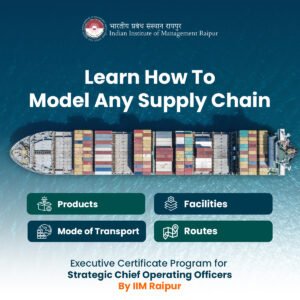The role of a Chief Operations Officer (COO) in today’s fast-paced business world is evolving rapidly, thanks to technology. As companies embrace digital transformation and rely more on innovative technologies, the responsibilities and expectations placed on COOs have changed significantly.
In this blog, we will explore how technology is transforming the role of a Chief Operations Officer and how professionals can stay ahead in this dynamic field.
Roles and Responsibilities of a COO
In addition to overseeing day-to-day operations, a Chief Operations Officer (COO) also has several other core responsibilities. These may include:
-
Strategic Planning: The COO collaborates with other executives to develop and implement the organisation’s overall strategic plan. They align operational goals with the company’s long-term objectives.
-
Resource Management: The COO is responsible for managing and allocating resources effectively. This includes optimising the use of financial, human and technological resources to achieve operational efficiency and productivity.
-
Process Improvement: The COO identifies areas for process improvement and implements strategies to streamline operations. They analyse existing processes, identify bottlenecks and implement changes.
-
Performance Monitoring: The COO establishes key performance indicators (KPIs) and metrics to monitor the organisation’s performance. They regularly assess operational performance, identify areas of improvement and take corrective actions to ensure goals are met.
-
Risk Management: The COO assesses operational risks and develops strategies to mitigate them. They implement risk management frameworks, establish contingency plans and ensure compliance with regulations and industry standards.
-
Team Leadership: The COO provides leadership and guidance to the operations team. They foster a positive work culture, promote collaboration and develop talent within the organisation.

Importance of a COO
A competent Chief Operations Officer (COO) plays a crucial role in the success of any organisation. They bring a wealth of experience and expertise to the table, focusing on operational excellence and driving the company forward.
-
One of the key responsibilities of a COO is to identify inefficiencies within the organisation. They analyse processes, systems and workflows to pinpoint areas that can be streamlined and optimised.
-
By implementing improvements, the COO helps reduce costs, enhance productivity and maximise efficiency across different departments.
-
In addition to cost reduction and process improvement, a skilled COO also plays a pivotal role in driving growth. They work closely with the executive team to develop and execute strategic plans that align with the company’s objectives.
-
By leveraging their industry knowledge and market insights, the COO identifies opportunities for expansion, new markets and innovative business models.
1. Significance of Continuous Learning
Given the rapid changes brought about by technology, COOS need to embrace continuous learning. Professionals who invest in their skills development through relevant courses like a Supply Chain Management Program or Logistics & Supply Chain Management gain a competitive advantage. These programmes provide them with insights into emerging technologies and industry best practices.
2. Rise of Technology in Operations
In recent years, technology has revolutionised every aspect of our lives – from personal communication to business operations. The same goes for the role of a COO. With advancements such as artificial intelligence (AI), machine learning (ML), robotics process automation (RPA) and blockchain, operations management has become more streamlined and efficient.
3. Technology’s Impact on Operations Management
Technology has automated many manual tasks, enabling COOs to focus on strategic decision-making. For example, AI-powered analytics tools can gather and analyse vast amounts of data to provide actionable insights. This allows COOs to make data-driven decisions that optimise processes, improve resource allocation and enhance overall operational efficiency.
4. Opportunities That Arise Due to Technological Transformation
With technology driving operational transformations, new opportunities have emerged for COOs. They can now explore innovative solutions like smart factories, Internet of Things (IoT) integration and predictive analytics to gain a competitive edge. These technologies enable real-time monitoring of production lines, predictive maintenance, inventory optimisation and seamless collaboration across the supply chain.
5. Challenges That Arise Due to Technological Transformation
While technology presents immense possibilities for COOs, it also brings challenges that need to be addressed. Cybersecurity risks have increased with the digitisation of operations. COOs must ensure that robust security measures are in place to protect sensitive data and prevent cyberattacks. Additionally, implementing new technologies requires upskilling existing employees or hiring new talent who are proficient in these technologies.
Embracing Technological Transformation The Right Way
In conclusion, technology is transforming the role of a Chief Operations Officer in profound ways. As companies adapt to digital transformation, COOs must embrace technological advancements and continuous learning to stay relevant and effective in their roles.
If you want to enhance your skills in supply chain management course or logistics & supply chain management, consider enrolling in Imarticus Learning‘s comprehensive courses. These courses provide the latest industry insights, practical knowledge and hands-on training to boost your career prospects. Visit our website today to learn more and embark on your journey towards becoming a successful Chief Operations Officer.

